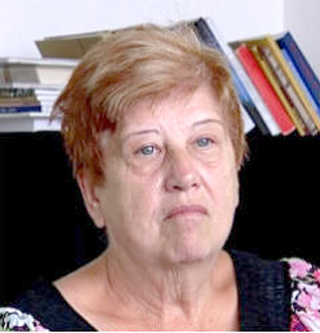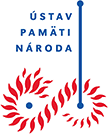Mária Hupková (1939)

Biography
“My nationality was given to me from God. I was born here. Thus nobody can deprive me of my citizenship.”
Mária Hupková was born on February 19, 1939. She comes from Bratislava and she considers herself to be an “old resident of Pressburg”. Her father died in the war and her mother married again afterwards. Mária was thus one of seven children. She attended school in Bratislava. She studied at the business academy. For some time she worked in Bojnice Spa, later she got employed in the State Quality Inspection. Finally she found a job in the Slovak Television where she worked as a secretary at the department of documentary films production. She perceived all the events and changes in society very sensitively. She vividly remembers the situation in the Czechoslovak Television when the Warsaw Pact troops took over it. She also found unforgettable to see army tanks in the streets of Bratislava, the more when she herself was a possible target for soldier with automatic in his hands. She also recalls the feelings of anxiety, fear or suspicion, which influenced people and their behaviour. Eventually, all these negative feelings resulted into the serious decision. In September 1968, along with her husband Ivan and their two children she immigrated to Australia. However, the Slovak judiciary sentenced them for emigration in their absence and in case of coming back home, they would be imprisoned. Thus they visited Slovakia, their homeland, yet after twenty years of living abroad, when the political changes allowed them to do so.
Seizure of the Premises of the Czechoslovak Television
“When they took our building, they came from all directions with automatics in their hands. We tried to discuss with them but they sent us away. The next day we came to work and on August 22, a lot of people gathered in the square. There were crowds of people in front of the post office. Pensioners came there for their pensions and we went to work as usually, and if am not mistaken, it was our payday, so went to take our money. Suddenly gunfire started, they fired to the tower of the Church of the Merciful Brothers and as people defended themselves they stepped back to protect their backs and when I looked back I saw soldiers with automatics everywhere behind those big glass windows of Tatrabanka, actually behind us. We left that building but they were on the roofs, too. At that time we lived at Michalská Street and helicopters were flying there in a low height. They aimed their automatics. They aimed them at us; a man could even feel it. It was horrible era. However, our crews were still working and I usually went with my husband for filming, so I experienced also situations when some of our stage crews were stopped by the Soviet guards, I remember it well. They took their cameras and all the materials and treated them like muck. It was really unpleasant period.”
Working in the Czechoslovak Television
“I had a close relationship with people, so I remember that they had to watch out. Sometimes they came and said: ‘Oh, I found out something interesting, I met really interesting people. And I don’t know how to do it to persuade them to let it broadcast.’ People were aware of many restrictions; they knew they had to watch out because all the programmes had to be approved by the panel where representatives of the culture department of the Central and Regional Committees decided. It wasn’t easy to convince them.”
Leaving the Republic
“Later, I think it took us two or three weeks and we decided to leave. We went to Vienna, Austria. Fortunately, we belonged to a small group of people whose clauses were valid and we also had a journalistic permission to travel abroad which was effective for ten years. It meant unlimited arrivals and departures. Thus it was a bit easier for us. However, we didn’t go together. I went with our children and my husband travelled separately. In Vienna everything went really quickly, and three weeks later we had already been in Australia. We decided to leave for Australia because it was far, far enough. We didn’t want to be nearby because we hated all the information about the situation in our country. Of course, we were pretty stressed.”
Leaving without Saying Goodbye
“We had no chance to say goodbye to anybody. It was a really sad situation. On August 21, 1968, it was my mom’s fiftieth birthday. We had prepared a big celebration. And finally it ended up like this. We left and couldn’t say anything. We couldn’t even say goodbye, we could do nothing. Moreover, we were one of those decent people who had left all the papers at home. Some people took them abroad and some western agencies took the papers from them. Subsequently they handed them in to the UN and this organization then asked why people were leaving Czechoslovakia. Our start in a foreign country was really hard. We didn’t speak English, therefore it took some time.”
What We Lost and What We Obtained
“The worst for us was to lose our family. Everybody has the family, everybody goes somewhere for holidays. But my children had never experienced it. Thus we tried to compensate them for it, so they had many aunts and uncles and we were the same for other children. I had a lot of “adopted” grandkids. And what was the asset? The tranquil life. But everything we had lost there made me really sad. We paid dearly for our freedom and tranquil life.”
Escape
“For some people it was very difficult to escape. Later we realized how easy it was for us, indeed. I heard about family with two children, one of them was only a baby, escaping Yugoslavia through some tunnel leading to Austria. They fired at them. They carried nothing. Another family was crossing the creek, I don’t really know those places, and they got into serious difficulties as well. They were afraid that they would get drown, because though they paid somebody to guide them across the border, in the last part of their way to Austria they had to ford the water on their own. It was pretty risky with children. I knew also one couple that went on holiday and the husband took his wife for a walk because there was a nice hill and he told her: ‘Let’s go to see this town from the hill.’ And she went in high-heeled shoes; we all went only with things we were wearing at that time, so she was absolutely unhappy. Finally she realized that they already crossed the border and escaped. They found themselves in Austria. However, the Austrians weren’t very friendly with us. They investigated people. Men were usually sent to prison for forty-eight hours and women spent some time in a camp. It was difficult. Something had to give those people enough strength to risk so much.”
Morning of August 21, 1968
“My mom came, she went to work early. Suddenly she was back and as we lived with them, she knocked at our door. ‘Mariena, Mariena, the Russians came.’ And I responded: ‘Oh mom, please!’ ‘Really, they are at Baťa’s.’ So we rushed out, we lived on the corner at the place where there was the dairy and now there is the Czechoslovak bank. We rushed out and army tank was really in front of the Trinity Church and its barrel was turning around and firing. One boy had a can full of gas. I stopped him and I said: ‘Are you crazy!? They are waiting for it. This way they destroyed a half of Budapest. They would shoot it here to pieces.’ And as I was talking to him, my mother grabbed that gas can and took it home. Because it was something what they were waiting for. They filmed everything they managed to destroy. For example they shot the box of traffic controller to pieces and took photos of it. Then they put it into the white book to demonstrate the counter-revolution in our country. It was what we had heard before we left. It was a horrible period of time.”
The story and videoclips of this witness were put together and published thanks to the financial support of EU within the programme Europe for Citizens – Active European Remembrance.


Updated at: 11.12.2023
Print Tweet